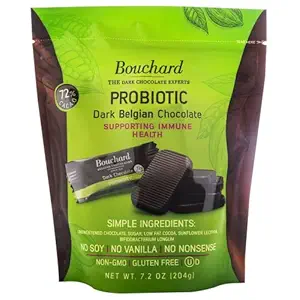Dark chocolate has long been touted as a guilt-free indulgence, but is there any truth to its health claims? Let's dive into the latest research to uncover the surprising science behind this beloved treat and explore whether it truly deserves a place in our diets.

Key takeaways:
• Dark chocolate contains flavanols, antioxidants linked to heart health
• Moderate consumption may offer benefits for mood and cognitive function
• Not all dark chocolate is created equal - quality and cocoa content matter
• Potential risks include heavy metal contamination and high calorie content
Is dark chocolate good for you?
Dark chocolate, particularly varieties with high cocoa content, is rich in flavanols - plant compounds with potent antioxidant properties[1]. These flavanols have been associated with various health benefits, including improved heart health and reduced risk of certain chronic diseases.
One of the most well-established benefits of dark chocolate consumption is its positive impact on cardiovascular health. Studies have shown that regular intake of dark chocolate may help lower blood pressure, improve blood flow, and reduce the risk of heart disease. The flavanols in cocoa appear to have anti-inflammatory effects and properties that help prevent blood clots, contributing to overall heart health.
However, it's important to note that not all dark chocolate is created equal. The health benefits are most pronounced in chocolate with a high percentage of cocoa solids (70% or more) and minimal added sugars or other ingredients[2]. When choosing dark chocolate for potential health benefits, opt for varieties with the highest cocoa content and fewest additives.
Health benefits of dark chocolate
Beyond cardiovascular health, dark chocolate has been linked to several other potential benefits:
- Cognitive function: Some studies suggest that the flavanols in dark chocolate may improve cognitive performance, particularly in older adults[3]. While more research is needed, there's evidence that regular consumption of high-flavanol cocoa products could enhance memory and processing speed.
- Mood enhancement: Dark chocolate contains compounds that may positively affect mood. A study published in 2022 found that participants who consumed 85% dark chocolate daily maintained better overall mood compared to those who ate chocolate with less cocoa or no chocolate at all[4].
- Antioxidant properties: The high concentration of flavanols in dark chocolate gives it potent antioxidant properties. These antioxidants help protect cells from damage caused by free radicals, potentially reducing the risk of various chronic diseases[5].
- Nutrient content: Dark chocolate is a good source of several essential minerals, including iron, magnesium, zinc, copper, and phosphorus. While it shouldn't be relied upon as a primary source of these nutrients, it can contribute to overall intake as part of a balanced diet.
The dark side of dark chocolate
Despite its potential benefits, dark chocolate isn't without drawbacks. Recent reports have raised concerns about heavy metal contamination in some popular brands of dark chocolate. A study by Consumer Reports found that several dark chocolate products contained levels of cadmium and lead that could be harmful if consumed regularly.
Additionally, dark chocolate is calorie-dense and often high in sugar, even in varieties with high cocoa content. Overconsumption can lead to weight gain and associated health risks. It's crucial to enjoy dark chocolate in moderation as part of a balanced diet.
Choosing the right dark chocolate
To maximize potential benefits and minimize risks, consider the following when selecting dark chocolate:
- Cocoa content: Choose chocolate with at least 70% cocoa solids for the highest flavanol content.
- Sugar content: Look for varieties with minimal added sugars.
- Sourcing: Opt for brands that prioritize ethical sourcing and transparent production practices.
- Heavy metal testing: Consider chocolates from brands that conduct regular testing for heavy metals.
Conclusion
While dark chocolate offers potential health benefits, it's not a miracle food. Moderate consumption of high-quality dark chocolate can be part of a healthy diet, but it shouldn't be relied upon as a primary source of nutrients or antioxidants. As with any food, balance and moderation are key.
For those looking to incorporate dark chocolate into their diet for potential health benefits, aim for a small serving (1-2 ounces) of high-cocoa content chocolate a few times a week. Remember to account for the calories and sugar content in your overall dietary plan.
As research in this area continues to evolve, stay informed about the latest findings and recommendations from reputable health organizations. By making informed choices and enjoying dark chocolate mindfully, you can savor its potential benefits without overindulging 🍫
Want to learn more about how different foods impact your health and longevity? Subscribe to our newsletter for the latest updates on nutrition science and healthy aging strategies.
References:
- https://www.ncbi.nlm.nih.gov/pmc/articles/PMC4696435/
- https://www.webmd.com/diet/health-benefits-dark-chocolate
- https://health.clevelandclinic.org/dark-chocolate-health-benefits
- https://www.ncbi.nlm.nih.gov/pmc/articles/PMC4696435/
- https://health.clevelandclinic.org/dark-chocolate-health-benefits
- https://www.ncbi.nlm.nih.gov/pmc/articles/PMC9589144/
- https://health.clevelandclinic.org/dark-chocolate-health-benefits
- https://health.ucdavis.edu/blog/good-food/dark-chocolate-health-benefits-the-good-and-the-bad-to-this-sweet-treat/2023/02
Citations:
- https://www.ncbi.nlm.nih.gov/pmc/articles/PMC9589144/
- https://www.webmd.com/diet/health-benefits-dark-chocolate
- https://health.clevelandclinic.org/dark-chocolate-health-benefits
- https://www.ncbi.nlm.nih.gov/pmc/articles/PMC4696435/
- https://health.ucdavis.edu/blog/good-food/dark-chocolate-health-benefitsthe-good-and-the-bad-to-this-sweet-treat/2023/02














Member discussion